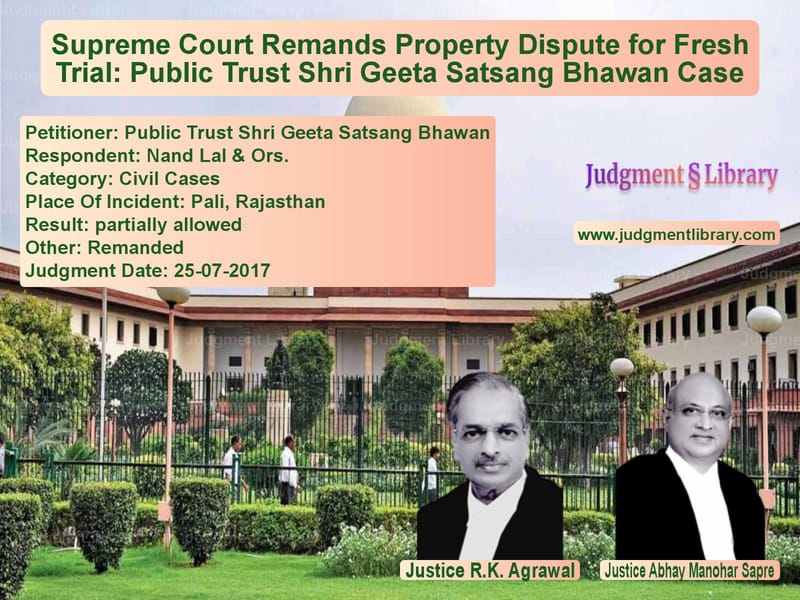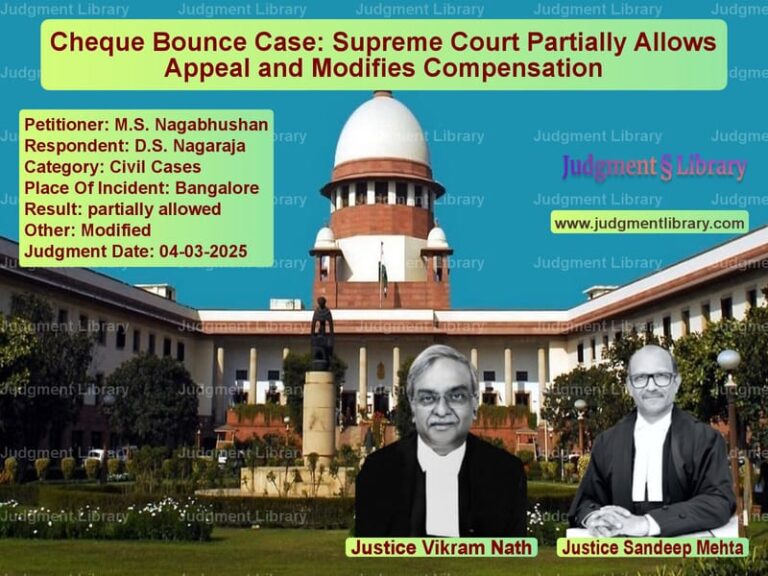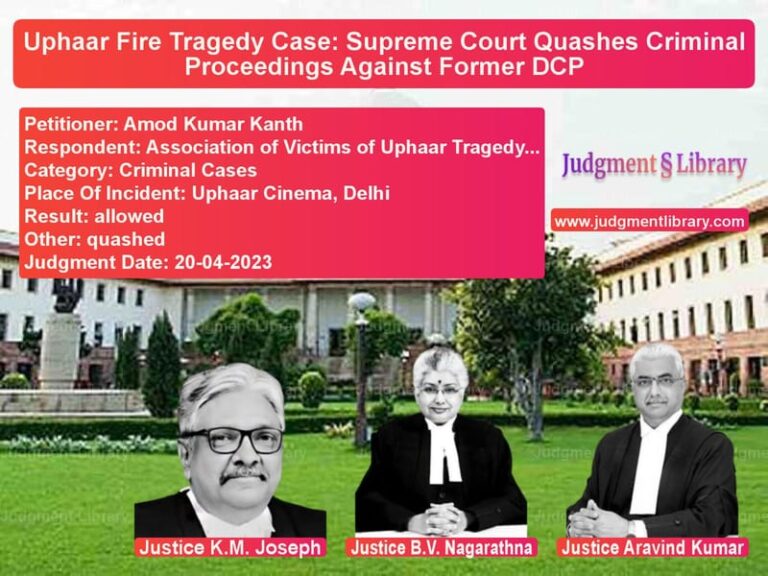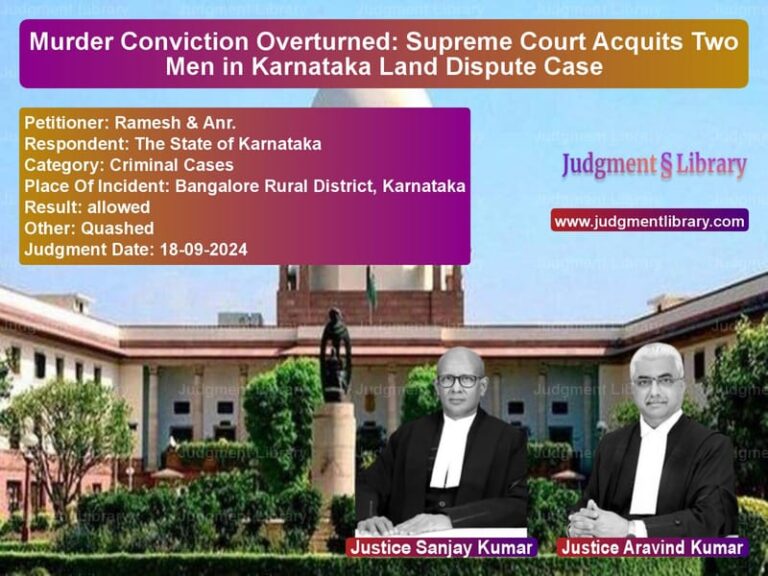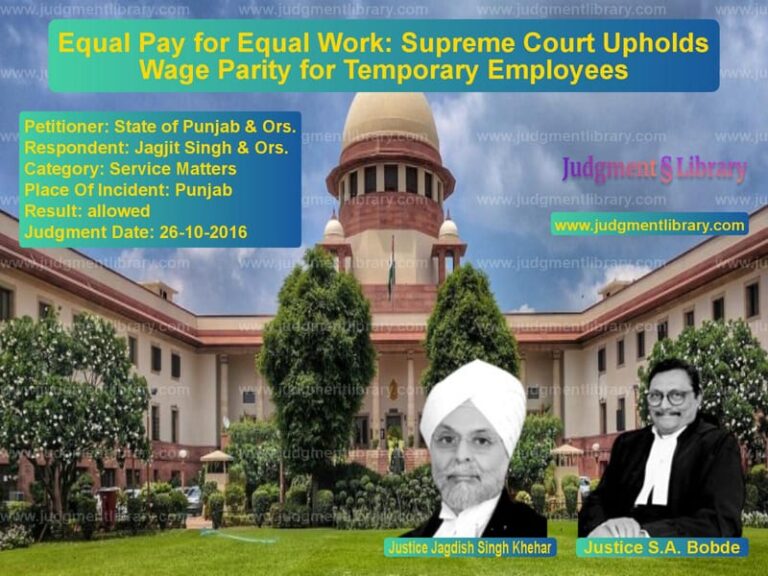Supreme Court Remands Property Dispute for Fresh Trial: Public Trust Shri Geeta Satsang Bhawan Case
The case of Public Trust Shri Geeta Satsang Bhawan v. Nand Lal & Ors. pertains to a property dispute regarding the eviction of tenants from shops owned by a public trust. The Supreme Court was called upon to determine whether the eviction suits filed by the trust were maintainable in the absence of trust registration and whether the lower courts had erred in dismissing the case outright.
Background of the Case
The appellant, Public Trust Shri Geeta Satsang Bhawan, had rented out two shops on its property in Pali, Rajasthan:
- Shop No. 7 was leased to Nand Lal at Rs. 500 per month in 1985, later increased to Rs. 625 in 1996.
- Shop No. 11 was leased to Nand Lal, Jitendar Rai Mathur, and M/s Mayur Auto Repairs at Rs. 600 per month in 1989, later increased to Rs. 750 in 1996.
However, the tenants stopped paying rent after 1996. The trust issued eviction notices under Section 106 of the Transfer of Property Act, 1882, terminating the tenancies effective November 30, 1998. Despite receiving notices, the tenants refused to vacate, leading the trust to file eviction suits in 1999.
Key Issues Before the Court
- Did the trust have the legal standing to file eviction suits before registering under the Rajasthan Public Trust Act, 1959?
- Was the dismissal of the suit by the High Court and lower courts justified?
- Could the trust continue its legal action after registering in 2013?
Arguments of the Petitioner (Public Trust Shri Geeta Satsang Bhawan)
The trust argued:
- The tenants had defaulted on rent payments and violated lease agreements.
- Eviction notices were legally served, and non-compliance justified legal action.
- The Rajasthan Public Trust Act, 1959, did not prevent an unregistered trust from filing a suit; it only restricted the hearing and decision.
- The trust had since registered in 2013, thus removing any legal impediment.
Arguments of the Respondents (Nand Lal & Ors.)
The tenants countered:
- The suits were not maintainable as the trust was unregistered at the time of filing.
- The eviction notices were waived since the trust accepted rent payments even after terminating the lease.
- The suits should have been dismissed outright since the trust was not legally recognized at the time.
Findings of the Lower Courts
The Trial Court ruled in favor of the trust, ordering eviction and recovery of rent. However, the tenants appealed to the Additional District Judge (Fast Track), Pali, which ruled that:
- The trust was not registered under the Rajasthan Public Trust Act at the time of filing.
- Under Section 29 of the Act, no suit for enforcement of a trust’s rights could be “heard or decided” unless the trust was registered.
- As a result, the suits were dismissed.
The Rajasthan High Court upheld the dismissal, leading the trust to approach the Supreme Court.
Supreme Court’s Analysis and Judgment
The Supreme Court, comprising R.K. Agrawal and Abhay Manohar Sapre, ruled in favor of the trust and remanded the case for fresh trial.
1. Bar on Hearing vs. Bar on Filing
- Section 29 of the Rajasthan Public Trust Act prevents an unregistered trust from proceeding with a case but does not prohibit filing a case.
- The Court clarified that the suits were not defective at the time of filing, but could not proceed until the trust was registered.
2. Registration in 2013 Lifts Legal Bar
- The trust registered under the Rajasthan Public Trust Act in 2013, making the restriction under Section 29 inapplicable.
- The Court ruled that once registered, the trust could continue its cases and the bar on hearing was removed.
3. Trial Court Lacked Jurisdiction Before Registration
- The Supreme Court held that the Trial Court erred in deciding the suits before the trust was registered.
- The judgment and eviction order were set aside as they were delivered without jurisdiction.
4. Eviction Cases Must Be Reheard
- The Supreme Court remanded the case to the Trial Court for a fresh hearing.
- The trust and tenants were allowed to amend their pleadings to reflect the trust’s registration.
Final Judgment
- The Supreme Court set aside the eviction order and directed a fresh trial.
- The trust was granted the right to pursue eviction proceedings now that it was legally registered.
- The tenants were given the opportunity to present their defense again.
Conclusion
This judgment clarifies that an unregistered trust cannot proceed with a suit, but once registered, it can continue litigation without refiling. It reinforces the principle that procedural technicalities should not prevent justice, especially when remedial action (such as trust registration) is taken.
For public trusts, this ruling underscores the necessity of legal compliance before initiating legal action. For tenants, it affirms that while registration issues can delay a case, they do not permanently nullify eviction suits.
The decision ensures a fair trial for both parties and upholds the intent of the Rajasthan Public Trust Act, 1959 in regulating property disputes involving religious and charitable institutions.
Don’t miss out on the full details! Download the complete judgment in PDF format below and gain valuable insights instantly!
Download Judgment: Public Trust Shri Ge vs Nand Lal & Ors. Supreme Court of India Judgment Dated 25-07-2017.pdf
Direct Downlaod Judgment: Direct downlaod this Judgment
See all petitions in Landlord-Tenant Disputes
See all petitions in Property Disputes
See all petitions in Contract Disputes
See all petitions in Judgment by R K Agrawal
See all petitions in Judgment by Abhay Manohar Sapre
See all petitions in partially allowed
See all petitions in Remanded
See all petitions in supreme court of India judgments July 2017
See all petitions in 2017 judgments
See all posts in Civil Cases Category
See all allowed petitions in Civil Cases Category
See all Dismissed petitions in Civil Cases Category
See all partially allowed petitions in Civil Cases Category

